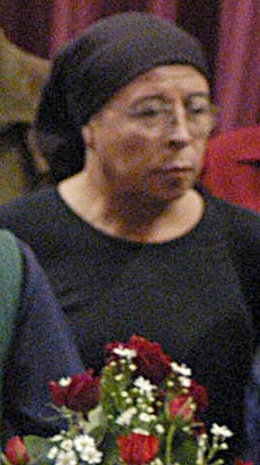Pedro Lemebel facts for kids
Quick facts for kids
Pedro Lemebel
|
|
|---|---|
 |
|
| Born | Pedro Segundo Mardones Lemebel 21 November 1952 Santiago, Chile |
| Died | 23 January 2015 (aged 62) Santiago, Chile |
| Occupation | Reporter, performance artist, chronicler |
| Language | Spanish |
| Nationality | Chilean |
| Education | Plastic arts |
| Alma mater | University of Chile |
Pedro Segundo Mardones Lemebel (21 November 1952 – 23 January 2015) was a Chilean essayist, chronicler, performer and novelist. He was nominated for Chile's National Literature Prize in 2014. He died of laryngeal cancer on 23 January 2015 in Santiago, Chile.
Contents
Life
Early career
Lemebel was born in a poor neighborhood in Santiago. In the late 1980s, he chose to be identified by his mother's surname, Lemebel, as his choice for surname instead of his father's (Mardones), as is the norm in most Latin American countries. He attended an industrial school of carpentry and metal forging at the Industrial de Hombres de La Legua High School and later studied plastic art at University of Chile's Art School. He subsequently became a high school art teacher.
Lemebel attended writing workshops to hone his skills and network with other writers, his first writing recognition was in 1982, when he won an award for his short story, Porque el tiempo está cerca. In 1986, he published as his first major work, the book Incontables, a compilation of short stories under the feminist publication label, Ergo Sum. A year later, he co-founded a performance collective that used the tactics of intervention and disruption of events to raise public consciousness about the struggles of minorities in Chile. The disruption and performances of the collective brought Lemebel into public limelight in Chile.
Yeguas del Apocalipsis
In 1987, Lemebel co-founded a group with Francisco Casas, poet, artist and student of literature. The duo called the group "The Mares of the Apocalypse,"or "Yeguas del Apocalipsis," a reference to the biblical "Horsemen of the Apocalypse" that appear in the New Testament. This performing duo made appearances sabotaging book launches, art expositions and even political discussions. Their appearances were usually surprising, provocative and demonstrated an aspect of counter culture.
Around this time he decided to abandon his paternal last name, Mardones, and begin using that of his mother, Lemebel.
Urban chronicles and other writings
Earlier in his career, Lemebel had attended workshops of the Society of Chilean Writers and gained the friendship of some feminist writers such as Pía Barros who later helped published his first book, Incontables. He returned to writing in the 1990s starting with series of urban chronicles that was published in Chilean newspapers, magazines and read on the radio. In 1995 and 1996, Lemebel wrote two books in a chronicle and hybrid literary style, a combination of reportage, memoir, public address, fiction and socio-political historical analysis. In 1995, he published La Esquina es mi corazón: Crónica urbana (The Corner is My Heart), writing about Chilean history from the perspectives of young adults raised in poor neighborhoods and those who are stigmatized socially. In 1996, he published Loco afán: Crónicas de sidario (Mad Urge: AIDS Chronicles), a piece of 31 short texts and images that detailed the journey of a group of marginalized gay youths in Chile through the period of dictatorship to the outbreak of AIDS. Lemebel was given a Guggenheim Foundation scholarship in 1999 for his literary accomplishments leading to increase appearances in forums and seminars in Chile and US.
He gained international recognition with his novel Tengo miedo torero which was the first book translated into English. In 2013, he was given the José Donoso Award. He died of laryngeal cancer in January 2015.
International recognition
In 1999, thanks to the influences of his friend, Chilean writer Roberto Bolaño, who had immigrated to Europe from Mexico in 1977 and has since lived in Spain, his book Loco Afán: Crónicas de Sidario was published for the editorial "Barcelonesa Anagrama," becoming his first work in the foreigner. Since then, his written work began to attract the interest in various universities and international educational institutions.
That same year he also participated in Festival of Guadalajara, Mexico, in replacement of Bolaño who had rejected the offer.
In 2001 he published his first novel Tengo miedo torero a difficult story of contextualized love during the attempt on the life of Augusto Pinochet (September 7, 1986). For the presentation of the book, Lemebel arrived in a red dress with a feathered headdress, at a ceremony with many people that was public with politicians, filmmakers, journalists and a few writers. The book would later gain international recognition after being translated into English by Katherine Silver, then French and Italian.
In 2003 he continued his work as a journalist, publishing his anthology of Chronicles Zanjón de la Aguada, that spoke of the gay community in neighborhoods of distinctive social classes in Santiago and where appeared some real people like the social leader and president of the Agrupación de Familiares de Detenidos Desaparecidos (AFDD) Sola Sierra. This work was followed a year later by Adios Mariquita Linda, another anthology of chronicles that maintained the same tendencies of his previous works.
In 2008 his sixth book of chronicles appeared, titled Serenata Carfiola.
On November 29, 2012, Lemebel participated in the "Feria del Libro de Guadalajara," publishing his new book of chronicles, titled Háblame de amores, showing a dramatization of his work "Susurrucucu Paloma."
On September 4, 2013, Lemebel was awarded the "Premio José Donoso," which he dedicated to his mother, the deceased Gladys Marín, and his readers belonging to the working class.
List of works
- La esquina es mi corazón.
- Loco afán: Crónicas de sidario (chronicles). Santiago: LOM, 1996.
- De perlas y cicatrices (chronicles). Santiago: LOM, 1998.
- Tengo miedo torero (novel). Santiago: Grupo Editorial Planeta, 2001. (translated as My Tender Matador by Katherine Silver, published by Grove in 2005)
- La esquina es mi corazón (chronicles). Santiago: Seix Barral, 2001.
- Zanjón de la Aguada. Santiago: Seix Barral, 2003.
- Adiós, mariquita linda.
- Serenata cafiola.
- Háblame de amores.
- Poco hombre.
- Mi amiga Gladys.
- Tengo miedo torero (script), 2015. (translated as My tender Matador for the film based on his homonymous novel)
Awards and prizes
- 1983: First Prize in the Contest of the Compensation Fund of Javier Carrera for "Porque el tiempo está cerca"
- 1999: Guggenheim Fellowship
- 2002: Nominated for the Altazor Award for "Tengo miedo torero"
- 2004: Nominated for the Altazor Award for "Zanjón de la Aguada"
- 2006: Nominated for the Altazor Award in Literary Essay for "Adiós, mariquita linda"
- 2006: Anna Seghers-Preis
- 2006: Nominated for the Altazor Award for the theatrical version of "Tengo miedo torero"
- 2013: Nominated for the Altazor Award in Essays and Memoirs for "Háblame de amores"
- 2013: Premio José Donoso
- 2014: Nominated for the Altazor Award in Essays and Memoirs for "Poco hombre"
- 2014: Nominated for the Chilean National Prize for Literature
Death
Pedro Lemebel died on January 23, 2015, in Santiago, Chile, of laryngeal cancer. Hundreds of people from all walks of life attended his funeral service, from celebrities to politicians. His extensive efforts in breaking the norm through his unique self-expression in his written works and activism have left a lasting impact on society and are part of his legacy. His remains are buried in the Metropolitan Cemetery of Santiago.
Influence and legacy
Pedro Lemebel is well known for his influence in the fight for homosexual rights, his work as a writer, and his strong political side.
He was profiled in the 2019 documentary film Lemebel, by filmmaker Joanna Reposi Garibaldi.
See also
 In Spanish: Pedro Lemebel para niños
In Spanish: Pedro Lemebel para niños


